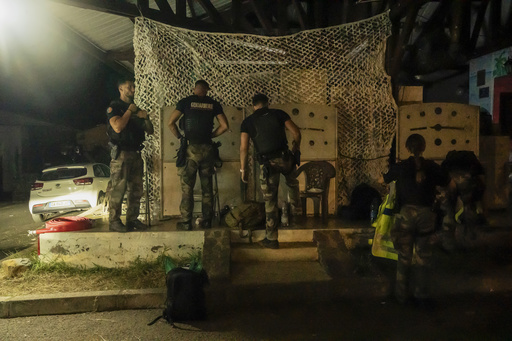MAMOUDZOU, Mayotte — Following the region’s most devastating cyclone in almost a century, Mayotte, France’s underprivileged Indian Ocean territory, is faced with the immense task of assessing fatalities, restoring vital services, and supporting a distressed populace. One week has passed since Cyclone Chido caused widespread destruction throughout the archipelago, leaving the area in dire need of assistance.
The impact of Cyclone Chido has placed immense pressure on the already strained healthcare facilities. Hospitals are inundated with patients suffering from cyclone-related injuries, as well as dehydration, malnutrition, and various diseases. The main hospital in Mamoudzou has seen its resources stretched thin amidst this crisis.
“We lost about 40% of our patient rooms, equating to around 50 to 60 beds,” Dr. Roger Serhal, the head of obstetrics and gynecology, explained. “The number of patients is overwhelming, and we lack the capacity to care for them all.” During the cyclone’s onslaught, which unleashed winds reaching 220 kph (136 mph), Serhal and his colleagues managed to deliver three babies, including through cesarean sections.
Due to significant structural damage, staff at the hospital are now forced to prioritize the most critical cases. While the official death toll stands at 35 as per the French Interior Ministry’s latest update, the count of severely injured individuals has climbed to 78, with 2,432 reporting minor injuries. Health Minister Geneviève Darrieussecq indicated that the actual numbers might be far higher, stating that estimates may not fully reflect the scope of the disaster.
Emergency supplies are being dispatched via air and sea, with reported deliveries of 31 tons of food and 108 tons of water. An additional 1.6 million liters of water is anticipated to arrive soon, providing some relief to the beleaguered islanders.
The hospital currently operates at just half of its capacity. In a desperate attempt to manage the influx, 109 patients have been evacuated to mainland France for urgent medical care. To respond to the escalating healthcare demand, three advanced medical posts have been set up on Grande-Terre, the main island of Mayotte.
The cyclone has completely devastated numerous neighborhoods, and many residents ignored warnings about the storm’s potential severity. Migrants, in particular, have avoided public shelters due to fears of deportation, possibly leading to a concerning rise in the death toll.
Doctors are increasingly worried about a looming health crisis, exacerbated by the lack of clean water and electricity amid overcrowded living conditions. “Patients are arriving with untreated illnesses as water and power shortages persist,” cautioned Dr. Vincent Gilles, the emergency medical director at the hospital. “We are particularly concerned about the risk of epidemics, like the cholera outbreak we managed to control just a few months back.”
Despite the tireless efforts of medical personnel, resources are alarmingly low. “If rain arrives, the situation could become catastrophic,” Serhal warned.
One patient, Saindou Mohamadi, aged 54, shared his struggles from his hospital bed after enduring a fractured arm and a sprained ankle during the storm that obliterated his home. “My mother is unwell, I’m unwell, and so is my child,” he lamented. “They need food to recover, but I am the one who provides it. Now, there is nothing.” Mohamadi’s narrative is emblematic of the hundreds of residents who have been rendered homeless and impoverished.
“I know I am not alone,” he said. “Many people have lost everything—their homes, their food supplies. I urge the government to support us with food and shelter.”
With a population exceeding 320,000, including around 100,000 migrants living in precarious circumstances, Mayotte is grappling with deep-rooted issues of poverty and neglect. It stands as the poorest overseas region of France and the European Union, with approximately 75% of its residents living in poverty. The recent calamity, compounded by existing challenges, has severely shaken the community’s confidence in governmental relief efforts.
While emergency aid progress is being made, including air deliveries of essential supplies, the vast need on the island is overwhelming. The local airport remains closed to civilian traffic due to storm damage, complicating the logistics of relief efforts.
French President Emmanuel Macron, who visited the area recently, recognized the critical situation and committed to rebuilding efforts. However, he faced backlash from citizens frustrated by the sluggish pace of aid distribution.
Interior Minister Bruno Retailleau has described the situation as “totally devastated,” noting that about 70% of the population has been severely impacted, with countless residents left vulnerable and without homes. As the island navigates the aftermath of Cyclone Chido, its residents, alongside overwhelmed healthcare staff, continue to confront monumental challenges in their path to recovery, one day at a time.




